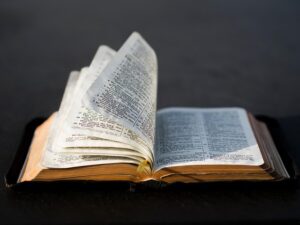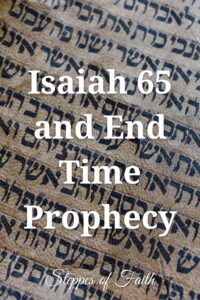
“For behold, I create new heavens and a new earth.” Isaiah 65:17
When we think of end-time prophecy, we often think of the books of Revelation, Daniel, and Thessalonians. But the prophet Isaiah also wrote about it. He not only foresaw the coming of the Messiah as the suffering servant (chapters 6,9,11,42,49,53); He also predicted the establishment of both the Millennial Kingdom and the eternal kingdom that follows it in Isaiah 65, a chapter in the Bible super-packed with details about what is to come. We will break it all down here.
Who Was Isaiah?
Isaiah ministered in and around Jerusalem in the land of Judah from 739-686 B.C. during the reigns of kings Uzziah (also called Azariah in 2 Kings), Jotham, Ahaz, and Hezekiah. God called him to prophesy in the year King Uzziah died (739 B.C.), joining fellow prophets Hosea and Micah.
Isaiah was highly educated and, therefore, well versed in political and religious issues. His education and passion for God allowed him to become a great speaker and an effective prophet. Though he was happy to serve, he knew, in the end, his warnings to Israel would fall on deaf ears.
From 739-681 B.C., Isaiah detail ed Israel’s future in numerous ways, more than any other biblical author in either testament. He laid it out in a style called “prophetic foreshortening.” Unlike John’s prophecy in Revelation, Isaiah did not predict future events in sequential or chronological timelines.
Because of the length of time covered in the book of Isaiah, scholars debate who wrote it. Many agree Isaiah wrote the first thirty-nine chapters, but they disagree about the remainder. The debate is because many of the present tense events described in chapters 40 through 66 occurred over such a long period (two centuries) that Isaiah could not have possibly written them all. How could this be?
One theory is multiple people added to Isaiah’s book after his death; however, the literary style is consistent throughout the book. Another theory is Isaiah did actually write all sixty-six chapters. As a prophet speaking to the public, he likely orally proclaimed them until he and, later, others transcribed them into one document (e.g., the Dead Sea Scrolls). The latter seems the most plausible. Ultimately, it does not matter who wrote the book of Isaiah. Everything in the Bible is the inspired word of God.
Book Breakdown
Isaiah prophesied significant events in Israel’s existence, its main themes being judgment and salvation. His book is primarily divided into three sections: 1-39, 40-55, and 56-66.
In the first section, Isaiah predicted a period of great destruction across Israel. He also describes the deportation and exile of its people, which came to pass in 586 B.C. when the Babylonian Empire invaded.
“Then Isaiah said to [King] Hezekiah, ‘Hear the word of the LORD of hosts. ‘Behold, the days are coming when all that is in your house and what your fathers have accumulated until this day shall be carried to Babylon; nothing shall be left,’ says the LORD. ‘And they shall take away some of your sons who will descend from you, whom you will beget, and they shall be eunuchs in the palace of the king of Babylon.’’” (39:5-7)
Chapters 1-39 describe the situation of the exiles in Babylon. In chapters 40-55, God pleads with Israel to return to Him. He also points out the foolishness of idolatry and the downfall of Babylon, and He confirms His covenant with His people to redeem and restore them.
It is chapters 56-66 that look ahead to God’s redemptive power in the end times for both Jews and Gentiles.

Calling the Gentiles
A loyal servant of the Lord, Isaiah attempted to warn a nation that had turned away from God and embraced pagan worship. They offered meaningless sacrifices to God and built altars to other gods. Because of their disobedience and rejection of the Lord, Isaiah declares God’s judgment unless they repent.
God then tells His chosen people that He will call the Gentiles to salvation (65:10), which we see fulfilled in Acts 10. But God will not forget His covenant with His chosen people.
In verses 8-10, God declares He will save a remnant of Jews in the end times and bring them into the gospel-believing church (Messianic Jews). However, God will judge those who reject Christ (v11-16), while those who remain loyal—both Jew and Gentile—will receive blessing (v17-25).
Paul Confirms Isaiah
The apostle Paul addresses the Jews’ rejection of Christ and its fulfillment in Romans 10.
“But they have not all obeyed the gospel. For Isaiah says, ‘LORD, who has believed our report?’” Isaiah 53:1/Romans 10:16
In reflecting on Isaiah’s prediction that God would call the Gentiles, Paul writes,
“But Isaiah was very bold and says: ‘I was found by those who did not seek Me; I was made manifest to those who did not ask for Me.’” Isaiah 65:1-2/Romans 10:20
Paul further recalls a prophecy Moses gave in Deuteronomy 32:21 that echoes Isaiah 65:1-2.
“I will provoke you to jealousy by those who are not a nation. I will move you to anger by a foolish nation.’” Romans 10:19
Paul recalls what has already been spoken and fulfilled. But in Isaiah’s time, it was yet to occur. Isaiah foretells that the Jews would reject Jesus as the Messiah. He also foretells that, until they discover the truth, God would extend His gift of grace to the Gentiles. We see this happening still today, but, according to Scripture, the Jews will accept Jesus as the promised Savior only at an appointed time (Isaiah 59:20-21/Romans 11:25-27).
John’s Revelation Confirms Isaiah
“As the new wine is found in the cluster, and one says, ‘Do not destroy it, for a blessing is in it,’ so I will do for My servants’ [Israel’s] sake, that I may not destroy them all. I will bring forth descendants from Jacob and from Judah and heir of My mountains. My elect [Gentiles] shall inherit it, and My servants shall dwell there.” Isaiah 65:8-9 (my additions)
Isaiah is not alone in prophesying that God will save the Jews because of His covenant with them.
Zechariah 12:10: “And I will pour on the house of David and on the inhabitants of Jerusalem the Spirit of grace and supplication.”
Romans 11:26-27: “And so, all Israel will be saved, as it is written: ‘The Deliverer will come out of Zion, and He will turn away ungodliness from Jacob. For this is My covenant with them when I take away their sins.’”
The apostle John also prophesies that God will save a Jewish remnant who accepts the gospel in Revelation 3:9-10 when God speaks to the church of Philadelphia.
“Indeed, I will make those of the synagogue of Satan, who say they are Jews and are not, but lie—indeed, I will make them come and worship before your feet and to know that I have loved you. Because you have kept My command to persevere, I also will keep you from the hour of trial which shall come upon the whole world to test those who dwell on the earth.”
Though Israel rejects Jesus as the Messiah, God will never forget His covenant with them.
[READ MORE: The Truth About Replacement Theology]

Jesus Confirms Isaiah
Isaiah describes in verses 11-16 that God will protect His remnant in the end times. He will provide for their every need, and they will “sing for joy of heart (v14).” But to those who stubbornly reject Him, God promises to purge them from His sight.
“Therefore, I will number you for the sword, and you shall all bow down to the slaughter. Because when I called, you did not answer. When I spoke, you did not hear but did evil before My eyes and that in which I do not delight.” (v12-13)
Isaiah’s prophecy is a part of Jesus’ many warnings about the end times in Matthew 24.
“Therefore, when you see the abomination of desolation…let those who are in Judea flee to the mountains. Let him who is on the housetop not go down to take anything out of his house. And let him who is in the field not go back to get his clothes. But woe to those who are pregnant and to those who are nursing babies in those days! And pray that your flight may not be in winter or on the Sabbath. For then there will be great tribulation, such as has not been since the beginning of the world until this time, no, nor ever shall be.” Matthew 24:15-21
The tribulation will happen swiftly and occur without warning, which is why Isaiah warns the Jews about rejecting God and pleads with them to turn back to Him. Indeed, his warning is for us all.
The Coming Kingdoms
Those who accept Jesus as Messiah and believe in His sacrificial death and glorious resurrection will enjoy unspeakable blessings in the Millennial kingdom. Isaiah describes them in verses 17-25 as he closes chapter 65. It is the clearest indication in the Old Testament of what we can expect, though he apparently bounces back and forth between the Millennial and eternal kingdoms in his description. First, Isaiah describes what the eternal kingdom will be like.
“For behold, I create new heavens and a new earth. And the former shall not be remembered or come to mind.” Isaiah 65:17
Revelation 21 echoes and confirms Isaiah’s prophecy about the New Jerusalem.
“Now, I saw a new heaven and a new earth, for the first heaven and the first earth had passed away.” Revelation 21:1
Isaiah also describes how God will restore the Jews in those days, and He conveys a promise for all of us.
“I will rejoice in Jerusalem and joy in My people. The voice of weeping shall no longer be heard in her nor the voice of crying.” (v19)
In the eternal kingdom, God promises there will be no more sorrow or crying. Instead, Jerusalem and its people will rejoice (v18).
Isaiah then goes back to the Millennial kingdom to describe how death will change. No one who is a believer in Christ will have a short life. In fact, Isaiah says if anyone dies before they reach one hundred years old, it will be very unusual.
Those who do not know Jesus will “be accursed” if they make it to one hundred (v20). Scholars believe a premature death is due to God taking that life away because of unrepented sin. God will eventually reverse the curse, but He will not reveal it until the eternal kingdom comes, and we all stand for the Great White Throne Judgement (Revelation 20:11-15).
Better Days
Isaiah illustrates social justice and freedom from misfortune in the Millennial kingdom in verse 21. He prophesies that no one will deprive anyone of what is rightfully theirs. Everyone will work together for each other’s needs as was originally intended.
“They shall build houses and inhabit them. They shall plant vineyards and eat their fruit. They shall not build, and another inhabit. They shall not plant, and another eat. For as the days of a tree, so shall be the days of My people. And My elect shall long enjoy the work of their hands.” (v21)
Isaiah’s prophecy here indicates there will be a reversal of the curse first given in Deuteronomy 28:30 to a disobedient Israel.
“You shall betroth a wife, but another man shall lie with her. You shall build a house, but you shall not dwell in it. You shall plant a vineyard but shall not gather its grapes.”

Overpopulation
God will also not permit any sudden death.
“They shall not labor in vain nor bring forth children for trouble.” (v23)
The Hebrew translation of “for trouble” as it relates to children points to future infant mortality. It will be its lowest ever recorded.
Since everyone will live well past one hundred years, it seems the earth will become highly populated as it grows exponentially. Isaiah’s prophecy in verse 23 supports John’s prophecy in Revelation 20:7-8, where Satan will provoke a massive group of people to come against Jesus at the end of the Millennial kingdom.
“And when the thousand years have expired, Satan will be released from his prison and will go out to deceive the nations, which are in the four corners of the earth, God and Magog, to gather them together to battle, whose number is as the sand of the sea.”
Enduring to the End
The final two verses of chapter 65 give us two beautiful promises of God’s attentiveness and peace in nature.
First, our relationship with the Lord will be closer than ever before. He will hear us before we ever speak a word. Before we ask anything, He will answer.
Second, peace will reign on the earth. Animals will no longer have a prey drive and no longer pose any dangers.
“’The wolf and the lamb shall feed together. The lion shall eat straw like the ox, and dust shall be the serpent’s food. They shall not hurt nor destroy in all My holy mountain,’ says the LORD.” (v25)
Isaiah’s end-time prophecy largely serves as a warning to Israel (and all of us) to repent. It is also a beautiful reminder of God’s power and faithfulness to those who are obedient to Him. Those who are obedient will enjoy a Millennial kingdom where there is no more suffering, pain, sorrow, or premature death. Those who endure will see the eternal kingdom, where it only gets better.
